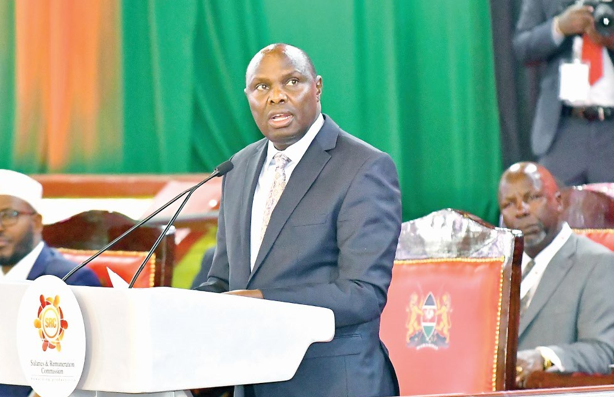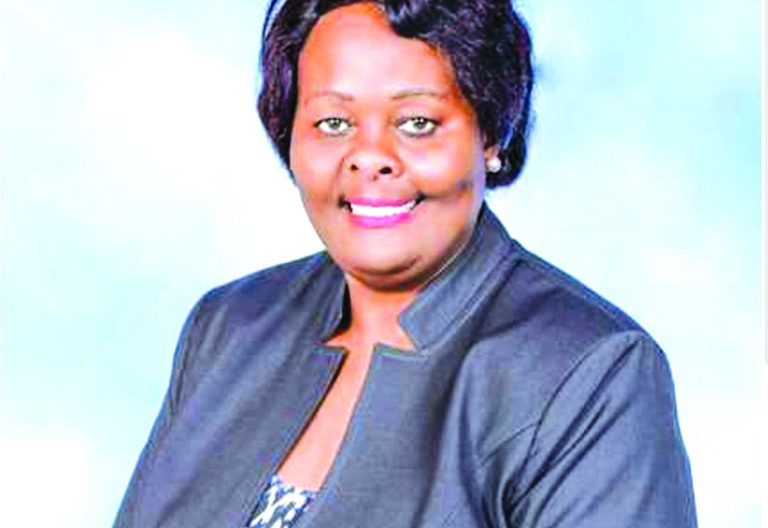State halts pay review for civil servants

The government has suspended review of salaries and allowances of all public officers indefinitely due to what it termed as hard economic times.
The announcement by Head of Public Service Felix Koskei and Salaries and Remuneration Commission (SRC) chairperson Lyn Mengich diminishes hopes of increased salaries for public servants any time soon.
Both leaders who spoke during the third National Wage Bill conference at Bomas of Kenya told public servants to brace for stagnated payroll as the government races toward achieving a 35 per cent wage bill-to-revenue ratio by 2028.
The three-day conference that kicked off yesterday will seek to generate consensus on reduction the national wage bill to 35 percent by 2028.
Koskei said the government was between a rock and a hard place as it juggles between controlling the ballooning wage bill and service delivery to the public.
“Fiscally sustainable public wage is an enabler to achieving desired economic development as it also closes the gap between the ratio of public servants to population and hence frees resources to spur investments that further promote economic growth which in turn improves the country’s ability to support higher wages and expanded staff compliment,” he said.
He warned that a high public wage bill is a threat to sustainable public expenditure as it crowds out resources that would have been used for development priorities and enhanced service delivery adding that any negotiations of improved salaries, wages and allowances must be cognizant of economic growth projections and trends.
“We cannot have systems where employers take action on terms and conditions of employment without having a conversation with those charged with revenue generation and collection,” Koskei said.
He went on: “The unions and employees should not agitate for salary increase and allowances without applying and checking the trends and economic performance of the country. It is foolhardy to ask what is not there. We need to be honest to ourselves and have a conversation.”
Koskei urged all employers, employees and unions to understand the status of the economy and the measures that the government has taken to turn it around.
No additional taxes
He said that the country is currently in a tight fiscal space thus it is not possible to give additional salaries because Kenyans who are paying taxes want them to go to projects and initiatives that will turn the economy around.
“The issue of salaries, allowances and benefits can be brought to the table, but at the moment as the President has announced, let us all live within our means. Kenya Revenue Authority collections are readily available for anybody to access. National and County governments are run by taxes and it is not the government’s intention to introduce additional taxes to pay salaries and allowances for now,” Koskei said.
He said that remuneration reviews entered by individual government institutions without consulting other relevant agencies had led to the mushrooming of industrial actions.
“Sometimes we operate in silos. Somebody in some corner sits down, signs a collective bargaining agreement without consulting treasury and checking micro and macro trends in the country, thereby bringing industrial actions that are very difficult to handle,” he said noting that several institutions continue to issue guidelines and negotiate CBAs without adequate involvement and consultation with relevant stakeholders.
High wage bill
On her part, Mengich suspended any remuneration reviews in government agencies indefinitely
“Affordability and fiscal sustainability are a key consideration in any collective bargaining negotiations.
Employers are therefore, advised not to consider any review of financial items, where there is no demonstration of ability to afford and sustain a review among other considerations,” she said.
She said that her commission has set a growth salary market positioning of the 50th percentile calling on institutions above this positioning to retain their salary structures while those below it progressively be moved towards the percentile.
Mengich said that all ministries have attained the 35 per cent wage bill while state corporations continue to grapple with a high wage bill of up to 45 per cent.
She said that over the last three years, the SRC received requests whose cost implication was Sh98 billion out of which SRC approved sh12 billion, hence preserving in the economy an amount of 86 billion.
“Through the streamlining allowances framework that was developed, the commission has saved 17.3 billion over four years by implementing phase one and phase two of the streamlining of allowances,” she stated.
For the government to achieve the stipulated 35 per cent ratio, Mengich said that the Public Finance Management Act 2012, and Regulations 2015, set very clear threshold for wage bill-to-revenue ratios for the two tiers of government.
“The PFM Act and National Government regulations state that national government expenditure on compensation and employees’ benefits, including benefits and allowances, shall not exceed 35% of the national government’s equitable share of the revenue raised nationally, plus other revenues generated by the national government,” she explained.
On managing counties’ expenditure on salaries, Mengich said that county executive members, with approval of the county assemblies, are mandated to set a limit on their respective county government’s expenditures on wages and benefits for its public officers which should not exceed 35 per cent of the county government’s total revenue.
“We are all aware that we live in a resource-scarce environment, where expenditures on public wage bill, operation and maintenance, development, debt repayment, and other obligations all compete for the limited resources we generate as revenue in our country.”
Improve productivity
“That discourse on 35 per cent has a two-pronged approach, one on managing the wage bill through several strategies and the other is on productivity,” she said adding that Kenya was ranked 27 out of 53 and 155 out of 189 globally on labour productivity by the International Labor Organisation in 2023.
These statistics, she stated, speak to Kenya being more of a consumer nation than being productive and that it is against this backdrop that all public institutions are required to put in place measures to manage the wage bill and to improve productivity.
“The Public Finance Management Act 2012 and regulations 2015 set a clear threshold of the wage bill to revenue ratio for the two tires of government that states that expenditure on compensations and employees benefits should not exceed 35 percent of the total revenue collected,” she said.
During the wage bill conference held in 2019, the commission developed and adopted various frameworks including productivity measurement that sought to streamline allowances in the public sector as measures to tame the nation’s wage bill.
In the 2021/22 Financial Year, the wage bill-to-revenue ratio dropped to 47.04 per cent from 51.4 per cent in the 2017/18 Financial Year.
The 2019 framework required public institutions from both the National and county governments to develop strategies and action plans to achieve the 35 per cent wage bill-to-revenue ratio.
The Third National Wage Bill Conference brings together officials from both the public and private sectors, civil society and non-profit organisations.












